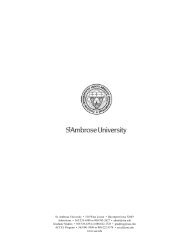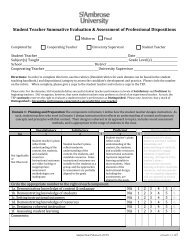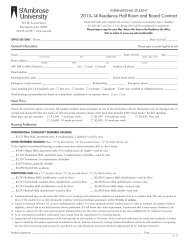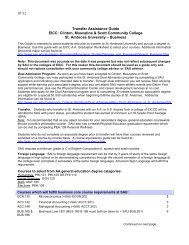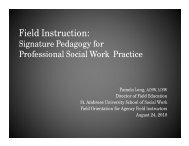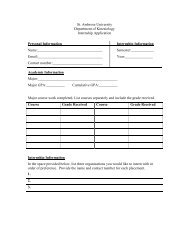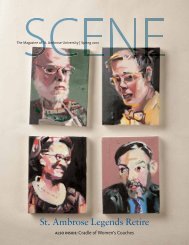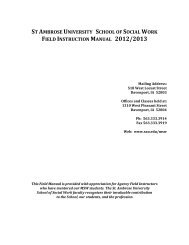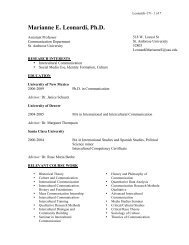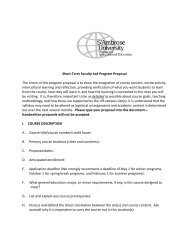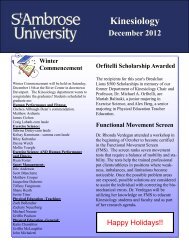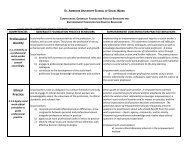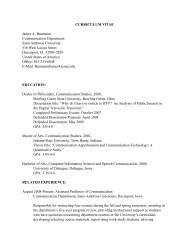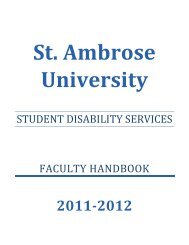St. Ambrose University 518 West Locust Davenport Iowa 52803 admit
St. Ambrose University 518 West Locust Davenport Iowa 52803 admit
St. Ambrose University 518 West Locust Davenport Iowa 52803 admit
You also want an ePaper? Increase the reach of your titles
YUMPU automatically turns print PDFs into web optimized ePapers that Google loves.
Undergraduate Programs<br />
BIOL 104. General Biology II 4 credits<br />
Continuation of General Biology I. Survey of<br />
plant and animal biology, and ecology. Required<br />
of all biology majors. Lecture and laboratory.<br />
Prerequisites: BIOL 103, MATH 151 or equivalent.<br />
+BIOL 106. Human Genetics<br />
3 credits<br />
Introduction to genetic principles and their application<br />
to human biology and society. Discussions<br />
of human genetic disease, medical genetic technology,<br />
biotechnology and genetic engineering.<br />
For non-science majors.<br />
+BIOL 107. Plants and Civilization 3 credits<br />
The use of plants by humans from botanical, economic<br />
and cultural perspectives. For non-science<br />
majors.<br />
+BIOL 109. Environmental Science 4 credits<br />
Application of basic ecological principles to<br />
human environment, including current and future<br />
energy sources, population growth and control,<br />
pollution, and world food supply. Lecture and<br />
laboratory. For non-science majors.<br />
+BIOL 110. Natural History for Poets 3 credits<br />
<strong>St</strong>udents learn local flora and fauna as a tool for<br />
understanding basic ecological principles. Lecture<br />
and field study. For non-science majors.<br />
BIOL 123. Selected Topics in Biology 2-4 credits<br />
Investigation of selected biological topics not<br />
treated in the regular department course offerings.<br />
BIOL 150. Career Orientation in<br />
the Biological Sciences<br />
1 credit<br />
Survey of careers in the sciences, particularly biological<br />
sciences and allied health science professions.<br />
Weekly discussions with practicing scientists<br />
and health professionals. Introduction to<br />
career decisions, opportunities, and development.<br />
Pass/No Pass only. Offered spring semester.<br />
BIOL 202. Human Anatomy and<br />
Physiology<br />
4 credits<br />
Systems-based introduction to the human body<br />
with study of both normal structure and functioning<br />
of all human organ systems. Lecture and<br />
laboratory. Prerequisite: One of BIOL 101, 103,<br />
CHEM 101, 103 or 105.<br />
BIOL 203. Cadaver Dissection Lab 1 credit<br />
A regional approach to anatomy utilizing human<br />
anatomical specimens (cadavers). <strong>St</strong>udents gain<br />
knowledge of human anatomy and dissection<br />
experience. Competitive enrollment. Applications<br />
are available from instructor and are due in<br />
February. Pass/No Pass course. Co-requisite:<br />
BIOL 202. Offered fall semester.<br />
BIOL 204. Advanced Human Anatomy and<br />
Physiology<br />
4 credits<br />
Regional-based study of the human body with an<br />
emphasis on certain significant regions. A more<br />
detailed examination of some bodily systems than<br />
in BIOL 202. Survey of clinical applications of<br />
some injuries/diseases. Lecture and laboratory.<br />
Prerequisite: BIOL 202.<br />
BIOL 211. Microbiology<br />
4 credits<br />
Taxonomy, physiology and genetics of microorganisms.<br />
Isolation, culturing and observation of<br />
bacteria. Role of bacteria in infection and immunity.<br />
Prerequisites: BIOL 103, 104; CHEM 105.<br />
+STAT 213. Applied <strong>St</strong>atistical Reasoning<br />
for the Sciences<br />
3 credits<br />
Cross-disciplinary course on how and why scientists<br />
use statistics to describe and interpret information<br />
they gather. Topics include descriptive<br />
statistics and basic inferential statistics.<br />
Prerequisites: Introductory course in major;<br />
MATH 121 or passing grade on screening test.<br />
BIOL 221. Invertebrate Zoology 4 credits<br />
Phylogenetic study of invertebrate animals,<br />
emphasizing functional morphology and systematics.<br />
Laboratory includes dissection and study of<br />
representative types. Lecture and laboratory.<br />
Prerequisites: BIOL 103, 104.<br />
BIOL 231. Vertebrate Zoology 4 credits<br />
Survey of the natural history and evolution of<br />
63



